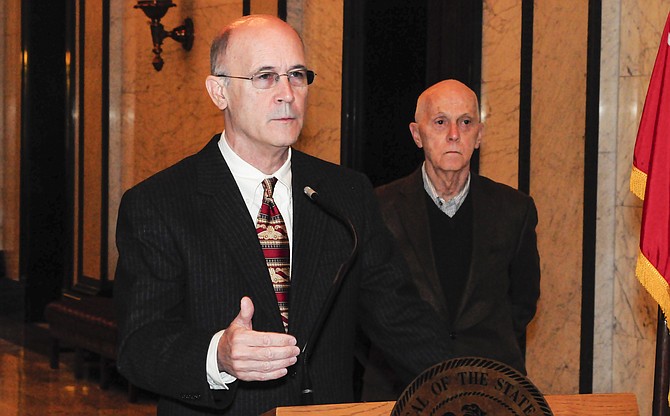Sen. Hob Bryan, D-Amory (left), told media at the Capitol this morning that making these budget priorities must be a bipartisan effort. Rep. Cecil Brown, D-Jackson (right), opened by expressing his surprise that the budget proposal for 2015 includes cuts to all levels of education funding. Photo by Trip Burns.
Democratic lawmakers announced their plans today to use the money not yet allocated in the state budget towards education, state employee pay and state highways. Sen. Hob Bryan, D-Amory, told media at the Capitol this morning that making these budget priorities must be a bipartisan effort.
Rep. Cecil Brown, D-Jackson, opened by expressing his surprise that, while leaders from the Joint Legislative Budget Committee have stated that they recognize education as a priority, the budget proposal for 2015 includes cuts to all levels of education funding.
Though Lt. Gov. Tate Reeves bragged that the Legislature would fund education greater than ever before this year, Brown says this is underhanded, and that the budget proposal still short changes public education by hundreds of millions of dollars.
Bryan said that Republican leaders claim the state has received a 3 percent revenue growth, which is why he is curious that the budget cuts public k-12, community colleges and universities. "We were just plain shocked to see that," Bryan said.
The first order of the Democratic budget proposal is paying for the teacher pay raise—which will cost $40 million—that garnered support from both parties and passed last year. The proposed budget only provides $32 million to the teacher pay raise, so the Democratic proposal requests adding $8 million to fund the entire raise.
Bryan also expressed his intent on finding methods to return to full funding of the Mississippi Adequate Education Program, which has only happened two out of the 17 years it has existed.
MAEP, Bryan clarified, "is the method of sending money from the state level to the public schools so the public schools can have that money as the basis for their budgets."
He compared the MAEP vehicle to the vehicle that reallocates a portion of sales taxes that are collected at the state level to municipalities, pointing out that no lawmakers complain about that procedure.
"There's been no discussion that we should somehow cut that money that's going back to the municipalities, nor is there any discussion that we should beat up on municipalities for what they're doing with that money. It is the basis for their budgets. And this is the same way the adequate education program works," Bryan said.
The MAEP request for 2015 was $2.426 billion dollars, which is an increase of $291 million over what public schools received last year; MAEP was underfunded last year by about $250 million. The Democratic budget proposal funds one-third of the difference, $97 million, and plans to fund that amount for the following two years.
The Joint Legislative Budget Committee proposal cuts community colleges by $3 million and universities $19 million. The Democratic budget proposal takes away these cuts and provides one-third of the budget requests from community colleges and universities for general support, which would be an additional $27 million and $14 million, respectively.
Brown and Bryan also spoke to the need for funding for state employees and state highways. They propose a $1,000 increase for each position, which would cost an additional $17 million. They also propose returning $30 million to the highway department for new construction.
State leaders have identified $188 million available in the state budget, and their proposals total $185 million. Brown and Bryan say this proposal can garner support across party lines, and it leaves $393 million in the rainy-day fund.


